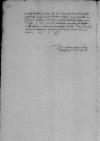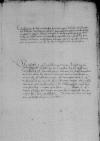Den ersamen und namhafftigen herrenn ⌊burgermeister und rathman der koniglichenn stad Dantzke⌋, unnsern gunstigenn freunden.
Unsern freuntlichen grus und alles gut zuvoran. / Ersame, namhafftige herren, besondere, guthe freunde. /
Wir haben gestriges tages Ewer Erbarkeit ⌊⌋, datum XVII dits monts, entpfangen und des inhalt wol vorstanden. / Auch wisse wir uns wol zuerinneren, was der schiffart halben der edele, ernvhest her ⌊Iohan von Werden⌋, burgermeister etc. unser geliebter freundt mit uns vortrawter weiss geredt, / das von uns nicht ane ursache vorblieben ist an hoff zu schreiben und dieweil wir doraus ermercken, / das kein vorbott der ausschiffung von Ewer Erbarkeit geschen, / nimpt uns wunder, / wie solchs in den ⌊reichstag⌋ gen ⌊Kracko⌋ gekommen etc. Wollen auch derwegen Ewer Erbarkeit unschult mit eygenem botten, den wir im kortzen an hoff zuschicken vorgenomen, an tag zu brengen nicht nachlassen, / wiewol wir dem hochwirdigen hern ⌊undercantzler⌋ den XII dits mondts mit koniglichem kemmerer, der uns koniglich mandat in dem falh an die ⌊herren rethe⌋ solch vorbott betreffend uberantwort, wie eingelegte copei meldet, ⌊⌋. / Wir wolten uns jo gerne Ewer Erbarkeit so vil uns muglich und zimlich vorhalten, dorinne uns nichts sol irren, so der ⌊unchristlich monch⌋ mit seinem unreinen leben und widder die heiligen der christlichen kirchen sacrament, die er itzt offentlicher und schandlicher weiss dan zuvor, nemlich widder die representacion des leyden ⌊Christi⌋ der heiligen messen in seinem unwarhaftigen predigen lestert, / uns nicht im gemuet thet beledigen, / das wir in ruhe der vorsorg halben nicht mugen haben beforchtende, das nicht etwas Ewer Erbarkeit und unserm ⌊vaterlande⌋, der guthen stadt, der wir so vil guts also yemants aus Ewer Erbarkeit mittel gonnen, / [des] vorgangen unfalhs nicht zukommen ... sorgfeldigkeit wolde Ewer Erbarkeit, wie wir uns vorsehen, geschicht neben und mit uns tragen, / und dieselbte uns zu gute halten, / das wir so gantz trewhertziger meynunge Ewer Erbarkeit, die wir gotlichen gnaden befelhen, / nicht haben mugen unangezeigt lassen. /
Datum bei unser collegiaten kirchen zur ⌊Gutstadt⌋, den XXII Marcii M D XL.
⌊Ioannes⌋, von Gots gnaden bischoff zu ⌊Ermelandt⌋.
Commissionem de hinc emittendis frumentis quae ⌊Vistula⌋ aduehuntur ad dominos hic consiliarios referam, / quomodo vero exteris emitti debeant / temporum cum negocio Danico racione non habita / quum apud nos illorum conspicua est penuria / et cataclismi aquarum irrecuperabilia detrimenta intulerint / indiscussum relinquo / operam equidem daturus sum ut quantum in me est ⌊serenissimae maiestatis regiae⌋ voluntati satisfiat. /
Wir schicken Ewer Erbarkeit widderumb diesen brieff unser freundschafft besibbung und wissen, das die recht und warhaftig ist. Frembde zeuge, dieweil die sache voraldert und die alten, die dorumb gewust, dovon vorstorbenn, / sein nicht zu uberkommen. / Vil weniger wirt Ewer Erbarkeit underscholtz von seiner hausfrawen wegen, / die nichts, wie uns wol wissentlich, in die sibbe gehort, / recht und warhafftig mugen gut thun. Bitten Ewer Erbarkeit dorein zusehen, das unser armen freundschafft vor gerichte kein kurtz geschehe, / das wir uns im grossern zubeschuldigenn erbittenn. /



